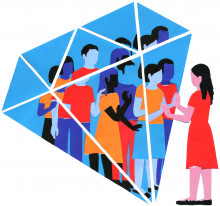Most of us have access to high-technology, especially on our computers, tablets, phones and other devices. But have we stopped to think about how it is impacting our lives?
Here is how Hubert Dryfus and Sean Dorrance Kelly put it in their book, “All Things Shining: Reading the Western Classics to Find Meaning in a Secular Age.”
To navigate by GPS is to ensure a series of meaningless pauses at the end of which you do precisely what you are told. There is something deeply dehumanizing about this. Indeed, in an important sense this experience turns you into an automated device GPS can use to arrive at its destination.
A recent article in the New York Times went further, suggesting not only that “apps” are dominating our lives, but that they are sorting us economically – those with the means don’t depend on apps as much as those who are not as financially well-off. Here is how the piece begins:
Bill Langlois has a new best friend. She is a cat named Sox. She lives on a tablet, and she makes him so happy that when he talks about her arrival in his life, he begins to cry.
All day long, Sox and Mr. Langlois, who is 68 and lives in a low-income senior housing complex in Lowell, Mass., chat. Mr. Langlois worked in machine operations, but now he is retired. With his wife out of the house most of the time, he has grown lonely.
Sox talks to him about his favorite team, the Red Sox, after which she is named. She plays his favorite songs and shows him pictures from his wedding. And because she has a video feed of him in his recliner, she chastises him when she catches him drinking soda instead of water.
Mr. Langlois knows that Sox is artifice, that she comes from a start-up called Care.Coach. He knows she is operated by workers around the world who are watching, listening and typing out her responses, which sound slow and robotic. But her consistent voice in his life has returned him to his faith.
“I found something so reliable and someone so caring, and it’s allowed me to go into my deep soul and remember how caring the Lord was,” Mr. Langlois said. “She’s brought my life back to life.”
Life for anyone but the very rich — the physical experience of learning, living and dying — is increasingly mediated by screens.
Not only are screens themselves cheap to make, but they also make things cheaper. Any place that can fit a screen in (classrooms, hospitals, airports, restaurants) can cut costs. And any activity that can happen on a screen becomes cheaper. The texture of life, the tactile experience, is becoming smooth glass.
The rich do not live like this. The rich have grown afraid of screens. They want their children to play with blocks, and tech-free private schools are booming. Humans are more expensive, and rich people are willing and able to pay for them. Conspicuous human interaction — living without a phone for a day, quitting social networks and not answering email — has become a status symbol.
All of this has led to a curious new reality: Human contact is becoming a luxury good.
As more screens appear in the lives of the poor, screens are disappearing from the lives of the rich. The richer you are, the more you spend to be offscreen.


